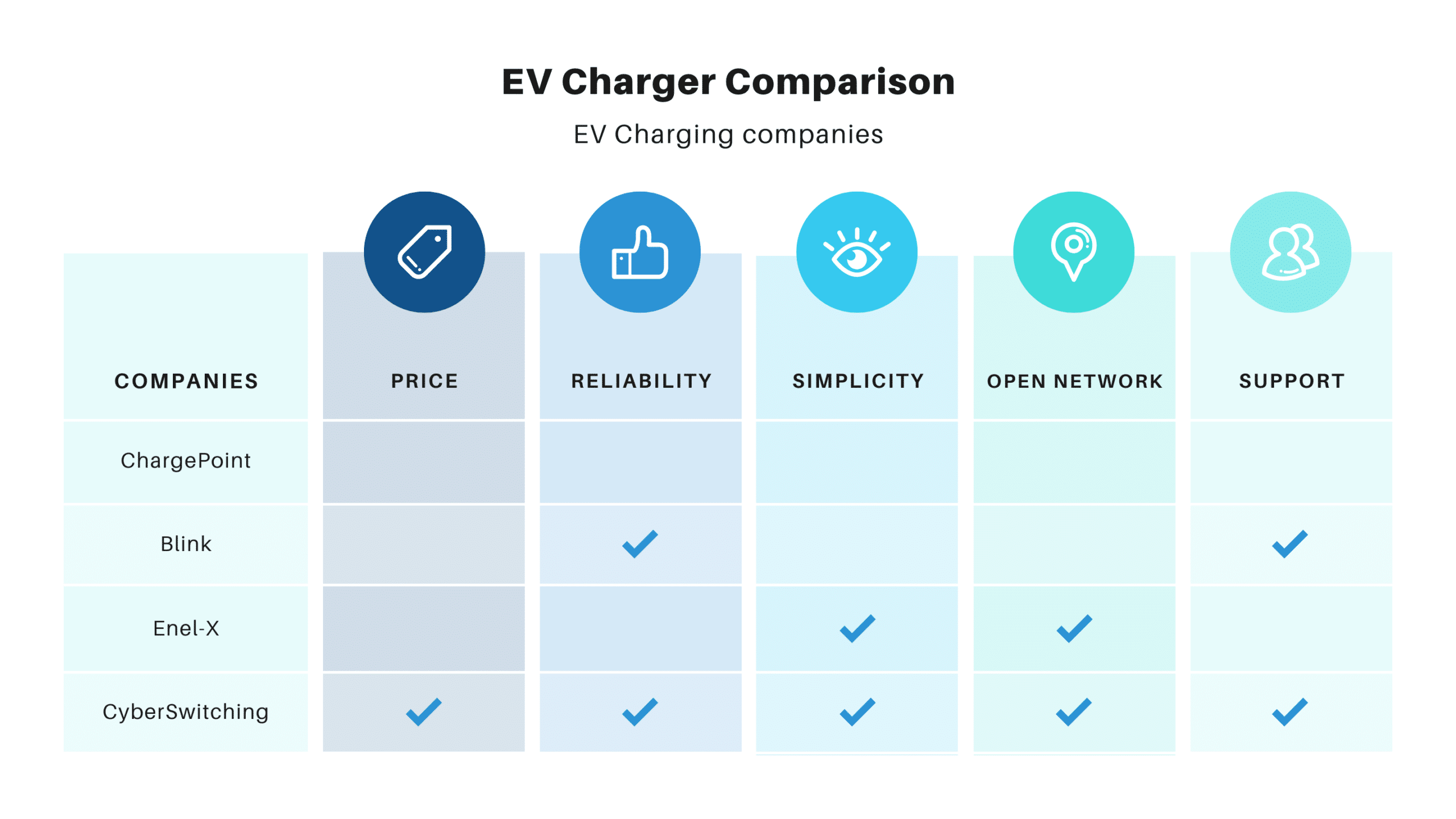Home / Commercial EV Charging Station / Workplace Electric Vehicle (EV) Charging Stations
EV Charging station companies comparison

$2,890.00 Original price was: $2,890.00.$2,790.00Current price is: $2,790.00.
$3,950.00 Original price was: $3,950.00.$3,450.00Current price is: $3,450.00.
Currently, in the U.S. there are around 130,000 public EV charging stations, but it is necessary to acquire more than 20 times this number to supply the EV charging needs of all drivers in the country. In today’s environmentally conscious workplace, workplace electric vehicle (EV) charging has emerged as a frontrunner in sustainable and employee-friendly practices. This innovative solution empowers employees to conveniently charge their EVs during their workday, fostering a greener commute and enhancing workplace satisfaction. Workplace EV charging is gaining traction across workplaces, offering several benefits for both businesses and their employees.
Companies prioritizing workplace EV charging are gaining a competitive edge in the job market, aligning with the values of many environmentally conscious professionals. This strategic decision not only benefits employees but also positions companies for success in the evolving transportation landscape. As electric vehicle adoption continues to rise, EV charging stations are becoming an essential workplace amenity for attracting and retaining top talent in today’s competitive job market.
Cyber Switching’s CSE1 EV Charger stands out as a top choice for workplaces, offering a seamless and efficient charging experience that complements the modern workplace environment. Its sleek design and user-friendly interface make it an attractive option for employees, while its advanced monitoring capabilities provide real-time insights into workplace charging activities, allowing companies to manage energy consumption efficiently and optimize workplace charging schedules. Additionally, the CSE1’s compatibility with diverse EVs ensures it caters to the diverse workplace ownership of electric vehicles among employees. Furthermore, the CSE1’s scalable design allows workplaces to easily expand their workplace charging infrastructure as the number of EV-owning employees grows, ensuring that the workplace EV charging solution can adapt to the evolving needs of the company and its workplace community.
Workplace EV charging stations can act as a low cost employee benefit that can help businesses attract and retain their employees. Employee turnover can become very expensive which is why additional perks such as workplace car charging can tilt the balance in favor for your company’s selection, especially for high-quality employees or talent that are concerned about the environment.
EV drivers are eligible for high occupancy vehicle lane privileges, this results in shorter transportation times and higher productivity. However, one of the main concerns of EV drivers is range anxiety or the fear to the car battery to get discharged completely. By installing workplace electric car charging points, you can eliminate the range anxiety for employees and maximize their productivity.
On the other hand, for realtors and property managers who can rent office buildings, considering adding workplace car charging solutions can be one of the most profitable property additions that you can think of. Studies have shown that in cities like Los Angeles, Seattle and Saint Louis, the average FSG rent can increase anywhere between 17% and 52% for office buildings.
BD Bio

JLL

Medallion

Watchfire

ADM

When selecting an EV charging station for workplaces, several key considerations should be taken into account to ensure a successful implementation:
By carefully considering these factors, workplaces can choose an EV charging solution that aligns with their specific needs, promotes sustainability, and enhances the overall experience for employees with electric vehicles.
RFID means Radio-Frequency Identification. This technology is already widely applied in multiple applications to enable user authentication by the use of RFID cards or keys. Smart Level 2 EV chargers such as the Cyber Switching CSE1 integrate RFID technology that allow you to limit and control who can access the EV charger.
If you are performing a workplace EV charger installation, then you will probably want that only you and your employees have access to this EVSE. By using a RFID card, you can do this and enable user authentication valid only for authorized personnel.
There are three types of EV chargers available in the market:
A driver will get a notification via mobile app about it. Also, The CSE1 EV charging station has a multi-colored LED charging status indicator which gives a reference of the charging status for the EVSE. When the vehicle is connected, a flashing green light will be seen, after the car has been completely charged, the green light will be constant.
Yes, there are multiple state level incentives available. CyberSwitching CSE1 EV charging stations got approved by over 75 rebate programs nationwide.
Yes, both the CSE1 and CSE2 charging station are ETL-listed equipment with a Type 3 enclosure that is rated to work indoors or outdoors. This means they’re rated to prevent dirt and dust from entering inside the equipment and is also protected against rain, snow, or sleet.
Both CSE1 and CSE2 EV charging stations could be mounted on the wall, on a standard pedestal as well as on the pedestals with cable management
CNET

TechCrunch

Nasdaq

TechTimes

IBT

Yahoo

Torque

Hackernoon

Email: info@cyberswitching.com
Phone: 1.408.436.9830
Having trouble? Find the answer to your query here. Don’t hesitate to contact us!
Follow our latest news and thoughts which focuses exclusively on Power Management and EV Charging
Your Power Management Partner for Over 25 Years Future Generations Depend on Our Decisions Today ™
2024 © All rights reserved by CyberSwitching